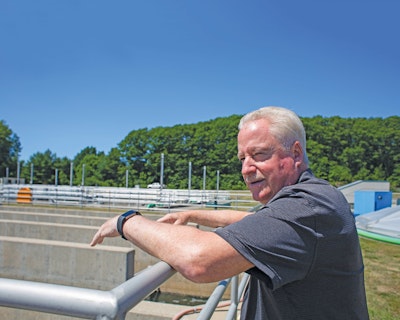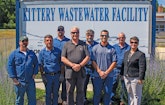
George Kathios looks over reports with Chief Operator Eric Taylor in the lab at the Kittery Wastewater Treatment Facility.
Whoever coined the phrase “experience is the best teacher” surely had George Kathios in mind.
Kathios, who is retiring as superintendent of the Kittery (Maine) wastewater system in January, started out 23 years ago as a maintenance technician, never having worked or studied in the wastewater field before. No degree. No experience. No connections.
However, it didn’t take him long before he had become a licensed operator, then plant operator, then chief operator, and finally superintendent.
Today, he is in charge of a system that consists of 44 miles of sewer lines, 24 pumping stations and a 2.5 mgd sequencing batch reactor plant.
“I was a little nervous when I started,” Kathios says. “No college education, not a lot of training. I just went from my experience and that has stood me well.”
Winding road
Kathios hails from Rochester, New Hampshire, and started right out of high school working for a marine construction company up and down the East Coast. He repaired docks and waterways and operated a crane. “I became a project manager, but the work was dangerous and the water was cold,” he recalls. “Plus, I wasn’t getting any younger so I started looking for a different job.”
The search took him to general construction, working on roads as well as wastewater treatment plants.
“I developed a pretty good knowledge of treatment plants and infrastructure,” he says, and since he wanted more job security, insurance and a pension, he applied at several treatment plants in the area.
“I said I’d take the job with whoever called me first,” he remembers. Kittery was the first to call back with an opening in the maintenance department, and Kathios’ clean-water career began.
“I didn’t know much if anything about process and process controls,” he says. “But from my construction days, I knew manholes and inverts and piping.”
Soon he was running crews and studied for and passed all his licensing requirements. “Through attrition at the plant, I became an operator 1, then chief operator for eight years.” When the superintendent’s position opened up 10 years ago, he applied for it and got it.
He still feels honored that the town trusted him with a $400 million investment and a staff of six. He was good at the basics, he says, and remembers working with contractors and bidding out work. “If you’ve done everything from the ground up, then when you hire contractors, they can’t get away with too much,” Kathios says. “They know that you know, and you don’t get taken for a ride. That (skill) came in handy for the town.”
The Kittery system
The system serves the towns of Kittery and Eliot, as well as the Portsmouth naval shipyards just across the state line in New Hampshire
“It’s pretty flat, so we operate a lot of pumping stations,” Kathios says. “There’s no gravity flow to the plant.”
The largest pipe in the system is a 24-inch reinforced concrete pipe, and the system contains an abundance of old clay pipe, 8 to 24 inches in diameter, much of which has been relined.
“Over the last 30 years, we’ve relined 90 percent of that, using CIPP,” Kathios says. “We’ve also sealed up manholes and structures and disconnected the lines from catch basins. We have no more combined sewer overflows.”
Kathios says sewer maintenance is nonstop. “We have a lot more upgrades to do on the older force mains, some of which are asbestos cement and are 40 to 50 years old.”
Kittery is too small to own its own fleet of sewer cleaning vehicles, so the town hires a firm to come in and clean the entire system twice a year. “It’s a deep cleaning,” Kathios says. “We’ll have them do some of the pumping stations three times a year.
“We’re undermanned by two or three people, and it’s not cost-effective for us to purchase our own truck.”
Kittery does use its own jet rodder to periodically clear lines of grease and roots on a monthly basis.
“We’re in pretty good shape,” Kathios says of his sewer system. “We’ve made the investment and gotten our infrastructure all buttoned up. It makes a big difference. We don’t get nervous anymore when it rains, and we don’t violate.”
Down at the plant
At the treatment plant, Kathios inherited an SBR (Aqua-Aerobic Systems) when he took over the top job. “It’s done a nice job for us,” he says. “It was new technology at the time (1994). The previous superintendent took a chance with the new technology. It’s produced a good, clean product.”
The SBR is designed for 2.5 mgd and is preceded by a new headworks facility featuring HUBER Technology screens. A new cyclone grit removal and grit pump system (Lakeside Equipment) has replaced an ancient bucket and chain system.
Effluent is decanted and chlorinated seasonally before being discharged to the Piscataqua River, which flows into the Atlantic Ocean near Portsmouth. “We’ve dabbled in using UV,” Kathios says. “We don’t like chemicals, but UV vendors would not guarantee the fecal kill and the installation would have been pretty expensive.”
Biosolids are dewatered on a new Andritz Separation centrifuge. Cake of 23 to 25 percent solids is shipped to a digester at the Brunswick air base, or farther upstate where it’s mixed with mulch and applied to state forest lands. “We used to have an old belt press, but we were only getting 16 to 18 percent solids. We wanted something that didn’t take an Einstein to operate,” he says of the dewatering upgrade.
Changes and challenges
Like any veteran of the clean-water profession, Kathios can look back on many changes in technology, as well as personnel.
Energy is a top priority. “We’ve taken advantage of new energy-efficient technology here,” he says.
“We installed high-efficiency motors to make our processes more economical. We have variable-frequency drives all over the plant, and they’ve really made a difference in our energy consumption, as well as our process control for oxygen and bacteria levels, for example.”
Kathios used his self-taught style to help the plant achieve even more energy-efficiency in the area of building heat. “We were paying a lot for propane and heating oil to heat our buildings,” he says. “Then I discovered that up here, OkoFEN (now Maine Energy Systems) was manufacturing wood pellet boilers.”
He investigated, did some research, and received a quote for $86,000 for two boilers — one in the main plant and the second in the centrifuge building.
“They’ve paid off in seven years,” he says. “And the price of wood pellets has not gone up. Every year the propane dealer asks how the pellets are doing and I tell him ‘just fine.’
“It was a good call,” he says of the decision.
Kathios has overseen the implementation of other improvements to his system. “We’ve gone to Gorman-Rupp workhorse pumps in our pumping stations. They’re easy to work on and maintain. We’ve been in the business long enough to know the problems with pumps, and our staff can take them apart and put them back together again, rather than hire someone to come in and do it for us.”
The plant’s headworks have been completely overhauled during Kathios’ tenure. “The bucket and chain arrangement was ancient and required replacement every year and a half,” he says. The new grit removal system is a significant step up.
The basics
Some of the improvements have been rather basic. “We did a lot of cosmetic work in the headworks area,” Kathios says. “Hydrogen sulfide had corroded the concrete walls, so we improved the ventilation system and cleaned and patched the walls with epoxy and repainted them.”
Similarly, all aeration piping and other parts of the plant have been repainted.
Kittery has adopted fine-bubble over coarse-bubble diffusers and has installed a SCADA system that monitors and controls dissolved oxygen probes and other aspects of plant operations.
In another case, underground aeration piping from the blowers to the basins has been repaired. “An operator came up to me one day and said there were bubbles coming up on the lawn,” Kathios remembers. “I said, ‘Oh boy, that’s a problem.’”
Inspection revealed leaky pipes, and Kathios and his staff had them relined, with the result that the blower system — which had been operating at one-quarter efficiency — is functioning far better today. “We’re saving a fortune on electric bills,” he says.
He’s also seen changes in personnel.
“I think when I started, there was a different kind of employee,” he says. “There wasn’t much interest in wastewater. You hired somebody and hoped and prayed they’d do well. The people you had to choose from might not have been the right type.”
Some employees seemed complacent — just content to be where they were, Kathios remembers. “They didn’t seem interested in furthering themselves.”
“That’s changed,” he says. “We’re seeing better quality in the people we hire. The last two we hired are really interested in what they’re doing. They’re doing the training, and in 10 years, they’ll actually be running this place.
“Having the right personnel makes all the difference,” he says. “You gotta love your job.”
Retirement
Kathios won’t be looking for the rocking chair when he retires next month. He plans to stay busy hiking, camping, skiing and fishing with his family.
“I’ll keep my smile on every day,” he says. “Plus, we just bought a new house so I’ll stay busy with landscaping and working around the house. I love doing things.
“I’d like to finish all those projects within the next two years, then maybe I’ll do a little consulting work on a part-time basis.”
No need for awards
It’s likely that George Kathios was the last person in the world who wanted to go down to Boston and be presented with an award in front of an applauding crowd.
He received the James J. Courchaine Award at the New England Water Environment Association’s Annual Conference last January, “in recognition of his outstanding efforts in the operation, maintenance and management of the Kittery wastewater collection system.”
“I didn’t need an award,” he says, noting that his career was satisfaction enough. “It was embarrassing in front of all those people.”
Now, however, he reflects on what turned out to be a satisfactory experience.
“James Courchaine is a consultant now, but I discovered at the presentation dinner that he’s a ‘regular Joe,’ who knows all about force mains, wet wells and infrastructure.”
Then, sometime after the presentation, Courchaine — who is known throughout the profession for his work in water and wastewater operations and management and has authored operator certification study books — dropped in at the Kittery plant. He and Kathios talked for hours about what they’ve both learned and what they’ve done.
Kathios calls the meeting uncanny because his office and the one Courchaine occupies sounded almost identical.
“I have this stone obelisk on my desk,” Kathios says. “Turns out he has one just like it. And we both have a collection of hard hats on display. We have a lot in common. We could have talked longer.”
With more than 60 years of collections experience between them, of course they could have.







